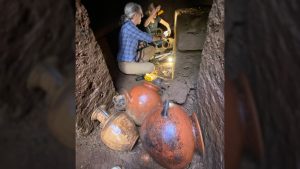Blue gold: How a Ghana mine’s troubles hit workers and UK politicians – and could cost British taxpayers

London: In late 2020, amid the economic maelstrom unleashed by Covid-19, there were few better places to be than sitting on top of a goldmine.
In Ghana, the west African country once called the Gold Coast by British colonisers, the Bogoso-Prestea mine was producing 4,000 ounces of the precious metal a month, valued at $6m (£4.5m).
As gold prices reached record highs, London-based Blue International Holdings – a seasoned investor in African energy projects, pounced to buy the mine for $95m.
Blue International promised “attractive financial returns while having a positive impact on the communities and countries in which it operates, and the planet as a whole”, according to its website.
It enjoyed the backing of a trio of British political heavyweights, including two members of the House of Lords and a government minister.
Yet, a few short years later, its future appears to have tarnished.
And, as the Guardian reveals now, the venture appears to have resulted in collateral damage to everyone from Ghanaian mineworkers to a member of the British royal family, a billionaire backer of the GB News TV channel and, possibly, UK taxpayers.
“Blue Gold is a scam” read a placard, as protesters, backed by a brass band, voiced their discontent in February 2024.
It was the latest in a string of demonstrations as miners and suppliers in the resource-rich Ashanti gold belt demanded to know why they were seeing no benefit from the precious metal buried beneath their feet.
Four years earlier, when Blue International arrived, the future had seemed promising.
The company boasted a track record of African investment stretching back to 2011, steered by its co-founders Andrew Cavaghan and Mark Green, professional investors with financial pedigree.
As well as its new goldmine in southern Ghana, the company also owned a promising hydroelectric power project in Sierra Leone, a partnership with the government in Freetown.
It came with a phalanx of prestige backers, drawn from the British political and business elite.
Lord Dannatt, the former head of the British army, and Lord Triesman, a Foreign Office minister with responsibility for UK diplomatic relations in Africa, served on its advisory board.
So, too, did Philip Green, who was rebuilding his reputation after the implosion of the government outsourcer Carillion, which collapsed during his time as chair in 2018.
John Glen, a Treasury minister between 2018 and 2023, held shares in the company.
The UK taxpayer was also significantly exposed. In early 2024, it emerged that the Treasury had lent Blue International £3.3m of taxpayers’ money via the “Future Fund” the previous year.
Glen, the MP for Salisbury in Wiltshire, said he was not aware of the loan application when he served at the Treasury and there is no suggestion that he did.
The Future Fund was designed, in the words of then chancellor Rishi Sunak, to support “start-ups and innovative firms” survive the pandemic by extending them loans that converted into equity.
In this case, the money supported a company engaged in extracting valuable minerals from African soil.
In mining, all can appear calm on the surface, even as things fall apart below ground.
By the time British taxpayers’ money was pumped into Blue International, its Ghanaian venture was on the brink of a financial collapse whose tremors reached from rural west Africa to the City of London.
Within two years of Blue International’s takeover, operations at Bogoso-Prestea had been shut down several times, according to corporate filings and contemporary reports.
Mineworkers blamed lack of investment from Blue, which owned and operated the mine via a local subsidiary, Future Global Resources (FGR).
Lack of output choked off cashflow and increased costs, as equipment failed or required maintenance, according to one corporate filing.
FGR failed to pay local suppliers, including the Ghanaian state electricity company, while mineworkers were left out of pocket, according to filings, fuelling local protests.
“It had devastating consequences,” said Abdul-Moomin Gbana, the general secretary of the Ghana Mineworkers’ Union (GMWU). He said workers’ salaries went unpaid for months, hitting the community hard.
“General conditions declined because they had no income. The communities virtually became ghost towns,” he said.
“It became obvious that if nothing was done, there was no way there could be a future for the mine.”
Blue Gold declined to answer questions about the claims of unpaid wages, and directed questions to FGR. FGR did not respond to requests for comment.
Eventually, in 2024, the Ghanaian government issued an ultimatum. Blue International must restore the mine to working production or hand back its lease, the right to own and operate the site.
The company tried to issue bonds – a form of IOU – in Ghana to raise cash that could be invested in bringing the mine back to production but the fundraising effort stalled.
The directors behind Blue International, Cavaghan and Green, restructured the debt-laden mine’s ownership, moving it into a new entity called Blue Gold, also owned and incorporated by them, as part of a plan to raise new investment in the US.
Despite this, in late 2024, the government of Ghana made good on its threat to seize back the Bogoso-Prestea lease.





